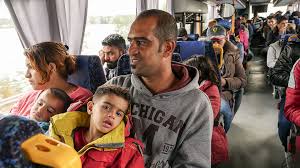Females were more likely than males to have theirasylum applications rejected by immigration officials of Nordic countries in 2015, according to a new report by the Nordic Council of Ministers.
But a Finnish Immigration Service official explained that male-to-female asylum ratios will be quite different for 2016.
Last year, 60 percent of males who applied for asylum in Finland were granted residence permits. It was 55 per cent for females.
Often, the discrepancies between male and female applicants’ asylum decisions were due to males having more grounds for being granted asylum, according to TirsaForssell, head of legal support at the Finnish Immigration Service (FIS) asylum department.
“Women are often co-applicants [with a man]. In other words, they’re dependent upon the result the man receives. And often men also have more reasons to apply for asylum,” Forssell said.
“The reasons [for men] include their occupation and their position in the military, sexual orientation and religion.”
However, Forssell urged people not to draw any conclusion from the current situation, saying the study only included figures from last year.
She insisted that the figures for 2016 will be different.
So far this year, “46.9 percent of all women have been granted asylum and 32.1 per cent of men,” she disclosed, adding that in some ways it is easier for women to be granted asylum because they are often in vulnerable situations.
The Nordic Council of Ministers requested immigration researcher, OutiLepola, to lay out the gender-based statistics.
She said while she did not know the factors behind the disparities themselves, the data point to deficiencies in the asylum process overall.
Across all Nordic countries, the study found that female applicants were not automatically granted interviews by female immigration workers, it is recommended by the United Nations Human Rights Council (UNHCR).
Officially, female applicants also have the right to be interviewed without their children present so they can freely talk about threats at home.
Issues that female applicants have that can be hard for officials to identify include honour-related violence, female genital mutilation and forced marriages.
Forssell said she did not see any shortcomings in the asylum process at her agency, saying personnel are trained in interviewing methods and to take note of particularly vulnerable groups.














